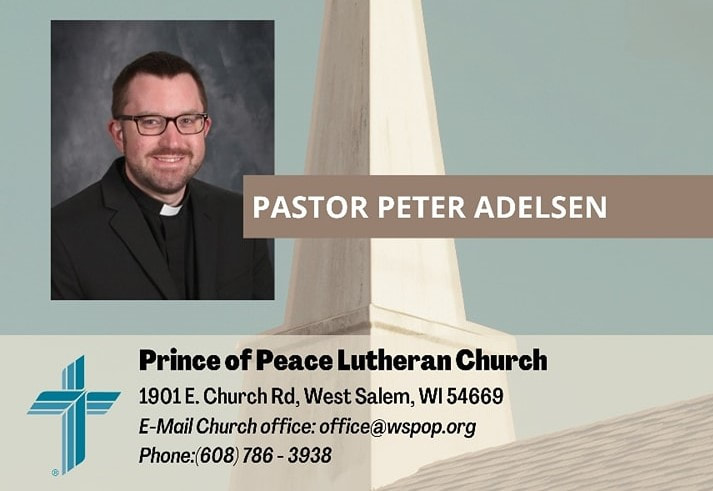I have been engaged in several conversations lately with members of several churches as well as other pastors about confirmation. In our church body, confirmation is the rite that celebrates a person publicly proclaiming the faith that God has been working in them through His Word by the power of His Spirit. This work we believe He will continue to do until Christ's return.
The rite called confirmation is not really about a student reaching a certain age or completing a checklist of to-dos. It is not about graduating to "full membership" in the church, nor is it really about an individual's first celebration of the Lord's Supper. Depending on the practice at each parish these may coincide with the rite of confirmation, but none of these things are what is at the center of the rite of confirmation.
The core of confirmation is the affirmation of the gifts God bestows in Holy Baptism. It's all about celebrating the call of the Gospel, at work by the power of the Holy Spirit. To be clear, the rite of confirmation is not a means of grace, it does not work the forgiveness of sins, nor did Christ command it. Rather it is a celebration that His means of delivering and strengthening faith (Baptism and the Word) have been at work, and the response is acknowledging Christ before men (Matthew 10:32-33).
Because participating in the rite of confirmation is a response to the work of the Gospel, we cannot turn it into a mandatory requirement and make it a law. Yet we talk about "getting confirmed" and too often equate that with some type of graduation, applying to it yet another checklist of things to accomplish before a student is "ready". Perhaps it is time that we intentionally began to change the way we talk about the joyous rite of confirmation. The goal would also be to reshape our thinking about this voluntary response to the call of the Gospel.
I realize that by saying that I just gave a few of my Lutheran brothers a bit of a heart attack. After all the explaination of the third article of the Apostle's Creed is pretty clear, "I cannot by my own reason or strength believe in Jesus Christ my Lord, or come to Him..." Absolutely, but remember we are not talking about confirmation as a means of grace. It is not a conversion of one who is dead in sin and transgression. The rite of confirmation is as I said before a public proclamation of the faith that God has been working as the "...Holy Spirit has called me by the Gospel and enlightened me with His gifts..."
What about it? Is it possible for us to get out from under the law we have piled onto confirmation with decades of tradition? What would it look like if the rite of confirmation flowed from the work of God in our baptism, and not from the traditions that we hold so dear? Would there be only one "Confirmation Sunday" or would individuals (adults or children or both) at many times throughout the year make that public proclamation? I find this discussion to be one that will take a long time to come to the end of, but one that is much needed in the life of the church.
The rite called confirmation is not really about a student reaching a certain age or completing a checklist of to-dos. It is not about graduating to "full membership" in the church, nor is it really about an individual's first celebration of the Lord's Supper. Depending on the practice at each parish these may coincide with the rite of confirmation, but none of these things are what is at the center of the rite of confirmation.
The core of confirmation is the affirmation of the gifts God bestows in Holy Baptism. It's all about celebrating the call of the Gospel, at work by the power of the Holy Spirit. To be clear, the rite of confirmation is not a means of grace, it does not work the forgiveness of sins, nor did Christ command it. Rather it is a celebration that His means of delivering and strengthening faith (Baptism and the Word) have been at work, and the response is acknowledging Christ before men (Matthew 10:32-33).
Because participating in the rite of confirmation is a response to the work of the Gospel, we cannot turn it into a mandatory requirement and make it a law. Yet we talk about "getting confirmed" and too often equate that with some type of graduation, applying to it yet another checklist of things to accomplish before a student is "ready". Perhaps it is time that we intentionally began to change the way we talk about the joyous rite of confirmation. The goal would also be to reshape our thinking about this voluntary response to the call of the Gospel.
I realize that by saying that I just gave a few of my Lutheran brothers a bit of a heart attack. After all the explaination of the third article of the Apostle's Creed is pretty clear, "I cannot by my own reason or strength believe in Jesus Christ my Lord, or come to Him..." Absolutely, but remember we are not talking about confirmation as a means of grace. It is not a conversion of one who is dead in sin and transgression. The rite of confirmation is as I said before a public proclamation of the faith that God has been working as the "...Holy Spirit has called me by the Gospel and enlightened me with His gifts..."
What about it? Is it possible for us to get out from under the law we have piled onto confirmation with decades of tradition? What would it look like if the rite of confirmation flowed from the work of God in our baptism, and not from the traditions that we hold so dear? Would there be only one "Confirmation Sunday" or would individuals (adults or children or both) at many times throughout the year make that public proclamation? I find this discussion to be one that will take a long time to come to the end of, but one that is much needed in the life of the church.


 RSS Feed
RSS Feed